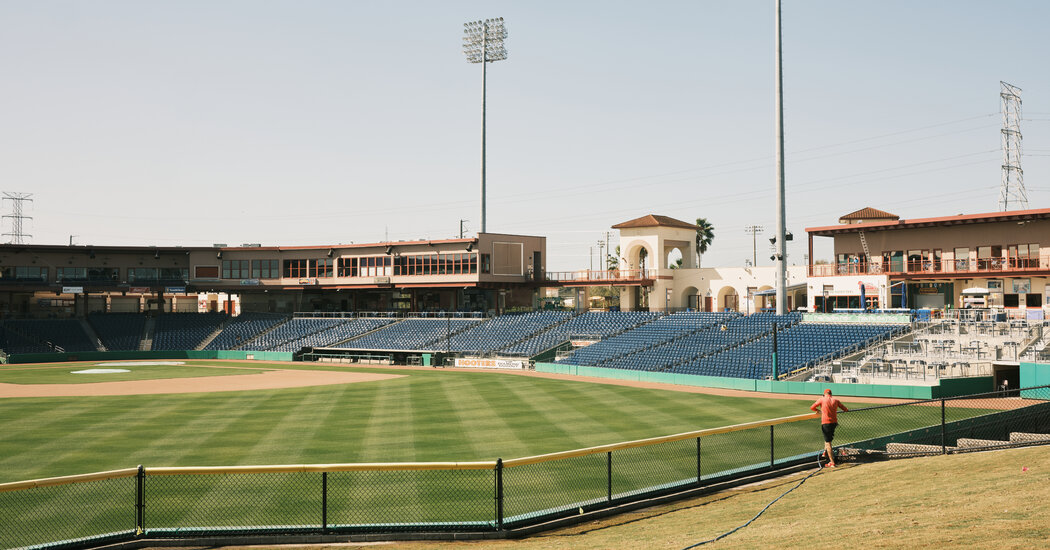
CLEARWATER, Fla. — On Wednesday morning, the day the Philadelphia Phillies’ pitchers and catchers were supposed to report to spring training, a familiar soundtrack returned.
Cleats crunching on the ground. Balls popping into gloves. Chatter in the dugouts.
It felt like baseball was back. But it wasn’t the version that was expected. Because of a continuing dispute over a new labor contract between Major League Baseball and the players’ union, spring training for all 30 clubs did not start in Florida and Arizona this week.
M.L.B. locked out the players on Dec. 2, minutes after the previous five-year collective bargaining agreement expired, resulting in players not being allowed at team facilities or to be in contact with club officials. Despite months of jockeying, silence and negotiating — the union made a new proposal on Thursday — many hurdles remain for a new deal.
So who exactly was on the practice fields at the Phillies’ spring training complex? They were the roughly 60 Phillies prospects and minor league players — those not represented by the M.L.B. players’ union — who had been invited to a minicamp.
“It’s still baseball,” said Frank Kitzinger, a Philadelphia resident who, along with his wife, Nancy, and a dozen fans, watched the workouts from behind a fence, as they often do this time of year. While it wasn’t the same, it beat watching no baseball in the Northeast cold.
The start of spring training is a sign of optimism for winter-weary fans. Once the Super Bowl is over, they begin counting down the days till pitchers and catchers report — then till the regular season, which is scheduled to begin on March 31. But as the calendar lurches forward, those who depend on spring training, and cherish it, are left wanting.
“We’re following it very closely, like the rest of the world anticipating spring training,” said Bridget Binsbacher, the executive director of the Cactus League, in Arizona, where 15 M.L.B. clubs host spring training. “But we’re not in the room, so we can’t really speculate because we’re not part of those discussions. We’re just concentrating on the things that we can control, and that’s being ready for opening day.”
The exhibition schedule is scheduled to begin in Arizona and in the Grapefruit League in Florida on Feb. 26. Unless M.L.B.’s owners and players agree to a deal before then, spring training games will also not start on time.
It would be the third consecutive year that spring training — which affects the towns, people and economies that thrive off it — was not normal. The coronavirus pandemic suspended spring training on March 12, 2020. Stadium capacities were reduced in 2021. This year, it’s the lockout.
According to a study the Cactus League conducted with Arizona State University, the league’s 2018 spring season had an economic impact of about $644 million. For the pandemic-shortened 2020 spring season, it was nearly $300 million less. Binsbacher said a normal spring training averages about 1.8 million visitors, with six of every 10 coming from outside Arizona.
“That has a direct impact on the surrounding businesses, lodging and all that is associated with tourism and spring training,” said Binsbacher, who is also a member of the Peoria, Ariz., City Council. “These are people behind these businesses and establishments that rely on this influx of travel year after year. It’s a big deal, and that’s our primary concern.”
M.L.B. Hot Stove and Off-Season Updates
-
- Locked Out: With M.L.B. and its player union unable to come to terms on a new collective bargaining agreement, the league enacted a lockout, freezing all transactions and starting baseball’s first work stoppage since the 1994-95 strike.
- Little Movement: In a pair of negotiating sessions, M.L.B. made an offer and the union countered. Delays could eventually impact spring training or the start of the regular season.
- Women to Watch: In a pair of significant firsts, Genevieve Beacom pitched professionally for one of Australia’s top teams and Rachel Balkovec was named as the manager of a team in the Yankees’ minor league system.
- Getting Their Guy: The Mets finally found a general manager and Steven Cohen, the team’s owner, says the move got universal praise at the owners’ meetings.
- Free-Agency Tracker: Look back at some of the signings, contract extensions and trades that happened before the lockout began.
In Florida, some business owners were frustrated that they might be casualties of a fight out of their control. The restaurants and bars of downtown Dunedin, for example, are a half-mile from TD Ballpark, which was largely lifeless on Wednesday, when the Toronto Blue Jays’ pitchers and catchers were supposed to report. Those businesses often see a bump in sales in February and March, particularly during spring break.
Ralph Kleinschrod, the owner of Home Plate, a restaurant across the street from the Blue Jays’ stadium, said he had noticed more Canadians visiting Dunedin in the past few weeks because of lifted border restrictions. In past springs, his place was filled for breakfast and lunch before 1 p.m. games.
Although Kleinschrod said business had been great even outside the spring training season — the Pinellas Bike Trail runs behind his restaurant — losing any exhibition games “is not good.” There are only 16 home games, after all, in the 2022 schedule.
“We hope that the games are coming,” he said. “If it’s coming delayed or later, it’s OK. But if they canceled everything, it’s not good for the whole town.”
Rob Manfred, the M.L.B. commissioner, suggested this month that a minimum spring training length of four weeks — two weeks shorter than normal — made sense to avoid a spike in injuries, like the one before the pandemic-shortened 2020 regular season.
On Thursday, M.L.B. and union officials met, with the players making changes to their asks. (M.L.B. also tweaked its proposal last week.) Hoping to get younger, cheaper players paid more, the union altered its request that all players with at least two years of service time be eligible for salary arbitration. It is now asking for that to be available to 80 percent of that pool of players. The union also asked for more money ($115 million total) in a bonus pool for players not yet in salary arbitration. M.L.B. has repeatedly insisted that expanding arbitration eligibility is one of the matters they will not touch.
In a holding pattern, several M.L.B. teams have told their employees to stay home until the lockout is resolved. Some teams, though, had some front office staff members at their training sites. For example: Dave Dombrowski, the Phillies’ president of baseball operations, and Sam Fuld, the general manager, were at the team’s facility on Wednesday, as were the major league team’s coaches.
Though the players practicing were younger talents, Kitzinger came to watch because he and his wife, who are retired, have enjoyed escaping to the Florida sun and watching spring training over most of the past six years. Kitzinger was understanding of labor negotiations but not of the dispute’s bleeding into the baseball calendar.
“I’m just disgusted,” he said. “I like my baseball and to have baseball as soon as I’d like to have it. But are they going to chase me away? Nah, it’s too ingrained in me for that. But marginal fans they’re going to chase away.”
About an 80-mile drive south of Dunedin, CoolToday Park, the training home of the World Series champion Atlanta Braves in North Port, Fla., was largely quiet on Tuesday save for a tiki bar in left field that was open for people to buy food and drinks. The $140 million stadium, built with private and public money, opened in March 2019.
“The next year, Covid started,” said Jill Luke, a city commissioner of North Port, which contributed $5 million to the stadium’s construction. “We haven’t had a great spring training since. Even last year, it was the closest to being open, but they still only allowed like 25 to 50 percent capacity.”
This weekend, the city had a party planned — World Champions Welcome Weekend — for the Braves at the complex. The two-day celebration, meant to coincide with the first days of spring training, was expected to have a parade, autograph sessions, games and music.
“We may not have the players there, but hopefully we’ll have the trophy,” Luke said. “We’re going to celebrate anyhow.”
Standing at the ticket window on Tuesday afternoon, Mary Margaret Bryant bought a pair of tickets with her husband. The two left Maine to stay in Florida for the winter and adopted Atlanta as a temporary second team.
Bryant had wanted to buy tickets for early next month. Her longtime favorite team, the Yankees, was supposed to visit North Port on March 13. But because of the uncertainty of the lockout, she decided that later in the month was a safer bet. So she got two tickets for one game in late March, six days before the regular season is scheduled to start.
“Maybe by then everything will be settled,” she said. Later, she added: “Hopefully — hopefully — they’re going to have the games here in all of March, which would be nice. Then I’ll come back and get more tickets.”




